
The epiclesis refers to the invocation of one or several gods. In ancient Greek religion, the epiclesis was the epithet used as the surname given to a deity in religious contexts. The term was borrowed into the Christian tradition, where it designates the part of the Anaphora by which the priest invokes the Holy Spirit upon the Eucharistic bread and wine in some Christian churches. In most Eastern Christian traditions, the Epiclesis comes after the Anamnesis ; in the Western Rite it usually precedes. In the historic practice of the Western Christian Churches, the consecration is effected at the Words of Institution though during the rise of the Liturgical Movement, many denominatons introduced an explicit epiclesis in their liturgies.

"Be Thou My Vision" is a traditional Christian hymn of Irish origin. The words are based on a Middle Irish poem that has traditionally been attributed to Dallán Forgaill.
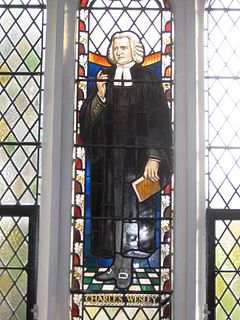
"O for a Thousand Tongues to Sing" is a Christian hymn written by Charles Wesley. The hymn was placed first in John Wesley's A Collection of Hymns for the People Called Methodists published in 1780. It was the first hymn in every (Wesleyan) Methodist hymnal from that time until the publication of Hymns and Psalms in 1983.
"The Spirit of God Like a Fire Is Burning" is a hymn of the Latter Day Saint movement. It was written by W. W. Phelps, one of the most prolific hymnwriters of early Mormonism.

Gerhard Tersteegen, was a German Reformed religious writer and hymnist.

"Eternal Father, Strong to Save" is a British hymn traditionally associated with seafarers, particularly in the maritime armed services. Written in 1860, its author, William Whiting, was inspired by the dangers of the sea described in Psalm 107. It was popularised by the Royal Navy and the United States Navy in the late 19th century, and variations of it were soon adopted by many branches of the armed services in the United Kingdom and the United States. Services who have adapted the hymn include the Royal Marines, Royal Air Force, the British Army, the United States Coast Guard and the United States Marine Corps, as well as the navies of many Commonwealth realms. Accordingly, it is known by many names, variously referred to as the Hymn of Her Majesty's Armed Forces, the Royal Navy Hymn, the United States Navy Hymn, and sometimes by the last line of its first verse, "For Those in Peril on the Sea". The hymn has a long tradition in civilian maritime contexts as well, being regularly invoked by ship's chaplains and sung during services on ocean crossings.

"Jesus Loves Me" is a Christian hymn written by Anna Bartlett Warner (1827–1915). The lyrics first appeared as a poem in the context of an 1860 novel called Say and Seal, written by her older sister Susan Warner (1819–1885), in which the words were spoken as a comforting poem to a dying child. The tune was added in 1862 by William Batchelder Bradbury (1816–1868). Along with his tune, Bradbury added his own chorus "Yes, Jesus loves me, Yes, Jesus Loves me..." After publication as a song it became one of the most popular Christian hymns in churches around the world, especially among children.

A Christian child's prayer is Christian prayer recited primarily by children that is typically short, rhyming, or has a memorable tune. It is usually said before bedtime, to give thanks for a meal, or as a nursery rhyme. Many of these prayers are either quotes from the Bible, or set traditional texts.

The Sinner's Prayer is an evangelical Christian term referring to any prayer of repentance, prayed by individuals who feel convinced of the presence of sin in their lives and have the desire to form or renew a personal relationship with God through Jesus Christ. It is a popular prayer in evangelical circles. It is not intended as liturgical like a creed or a confiteor, but rather, is intended to be an act of initial conversion to Christianity. While some Christians see reciting the sinner's prayer as the moment defining one's salvation, others see it as a beginning step of one's lifelong faith journey.
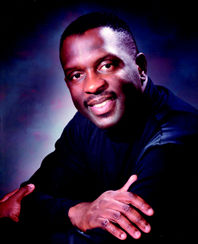
Moses George Hogan was an American composer and arranger of choral music. He was best known for his settings of spirituals. Hogan was a pianist, conductor, and arranger of international renown. His works are celebrated and performed by high school, college, church, community, and professional choirs today. Over his lifetime, he published 88 arrangements for voice, eight of which were solo pieces.
In Christian liturgical worship, preces are short petitions that are said or sung as versicles and responses by the officiant and congregation respectively. This form of prayer is one of the oldest in Christianity, finding its source in the pre-Christian Hebrew prayers of the Psalms in temple worship.
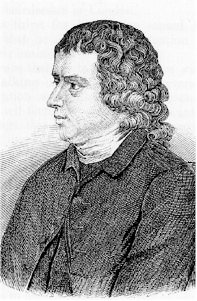
"Come Thou Fount of Every Blessing" is a Christian hymn written by the pastor and hymnodist Robert Robinson, who penned the words in the year 1758 at the age of 22.
Jaroslav Vajda was an American hymnist.
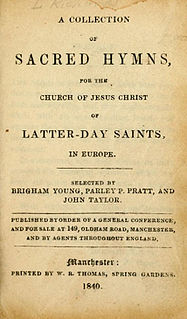
A Collection of Sacred Hymns for the Church of Jesus Christ of Latter-day Saints in Europe, informally known as the Manchester Hymnal, was first published in Manchester, England, in 1840. Like the first Latter Day Saint hymnal, this hymnal is text-only; it went through many editions, lasting until 1912 —future editions supposedly had extra hymns added, but the first few had 271.
"There Is A Balm in Gilead" is a traditional African American spiritual. The date of composition is unclear, though the song dates at least to the 19th century. A version of the refrain can be found in Washington Glass's 1854 hymn "The Sinner's Cure".
Thanksgiving after Communion is a spiritual practice among Christians who believe in the Real Presence of Jesus Christ in the Communion bread, maintaining themselves in prayer for some time to thank God and especially listening in their hearts for guidance from their Divine guest. This practice was and is highly recommended by saints, theologians, and Doctors of the Church.

Psalm 108 is the 108th psalm in the Book of Psalms. The first verse attributes it to King David, the author of many Psalms. It is a hymn, beginning in English in the King James Version: "O God, my heart is fixed; I will sing and give praise, even with my glory". In the slightly different numbering system in the Greek Septuagint version of the bible, and in the Latin Vulgate, this psalm is Psalm 107. In Latin, it is known as "Paratum cor meum Deus".
"Gwahoddiad" is a Welsh hymn of American origin.
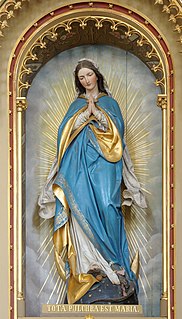
"Immaculate Mary" or "Immaculate Mother" is a popular Roman Catholic Marian hymn. It is also known as the Lourdes Hymn, a term which also refers to the hymn tune itself. It is often sung in honour of the Immaculate Conception of the Blessed Virgin Mary.

Charles Davis Tillman —also known as Charlie D. Tillman, Charles Tillman, Charlie Tillman, and C. D. Tillman—was a popularizer of the gospel song. He had a knack for adopting material from eclectic sources and flowing it into the mix now known as southern gospel, becoming one of the formative influences on that genre.













